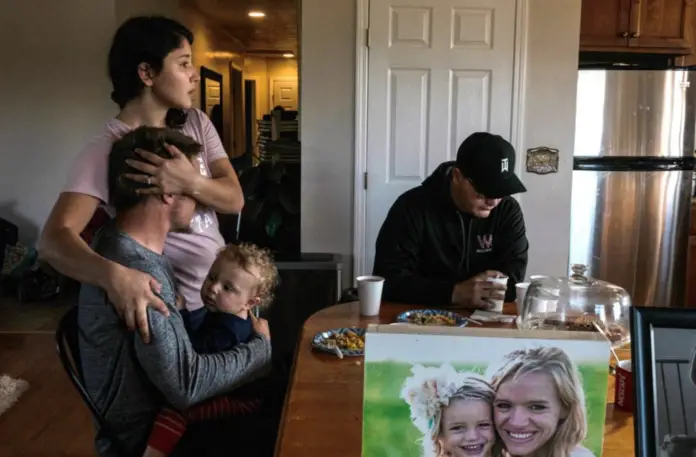
The image of a white pickup truck burning in the middle of a dirt road crosses the minds of Mexicans and Americans who remember the Langford-LeBarón family massacre. The paint blistered under the flames, the tires melted into the ground, and the broken voice of a relative who records the scene screaming that his loved ones were riddled with bullets and burned. That scene, which has become part of the collective memory of violence in Mexico, opens the documentary series LeBaron, Death in the Promised Land. Four chapters with new images dissect the story of the attack that left three women and six children dead and that opened a wound in November 2019 that still hurts in the Mormon community on the border.
Five years have passed since an armed group brutally massacred Rhonita LeBarón, her children Howard and Crystal, 12 and 10 years old, and the two babies, Titus and Tiana, just seven months old. She was accompanied by Christina Langford de Johnson and Dawna Ray de Langford, the other two women who were also murdered along with two of the latter’s children. The group was divided into three Suburbans that crossed a dirt track that crosses the border between Chihuahua and Sonora. Eight children from the family survived and walked for kilometers to find help. Baby Faith was eight hours next to her mother’s lifeless body in the car until the authorities arrived. The headlines of that day left their mark on several homes, including that of the director of this project, Carlos Pérez Osorio. “I remember thinking that a line had been crossed from which there was no turning back,” says Osorio, who had already exposed other heartbreaking stories of insecurity in Mexico, such as his first film, the documentary The Three Deaths of Maricela Escobedo.
An investigative team compiled all the testimonies, gathered data from official, private and leaked sources, and listened to the opinions of the families. The LeBaróns and the Langfords differ from each other and from the authorities’ version, which points to a mistake by organized crime to open fire on the vans that they mistook for a rival group. “We tried to bring together all the versions so that the public can draw their own conclusions, since the families have different agendas,” explains Osorio. The unknowns about the reason behind the attack, the way of executing a family of women and children, the power games that reign in the area and the identities of the murderers are revealed in the production of N+ Docs and Filmadora Documental, which premiered on November 1 on ViX.
Julián LeBarón points out that this series not only addresses the history of violence and insecurity surrounding the attack on the women and their children. It speaks of a context permeated by the presence of organized crime, which has kidnapped, extorted and murdered several members of their community. Among them is his brother Benjamín, murdered by a group of hitmen in July 2009 along with his brother-in-law, Luis Widmar. The poet Javier Sicilia, whose son was murdered in 2011 along with six friends in Morelos, also participates in the documentary to link the barbarity of the security crisis throughout Mexico. In parallel, the production also looks at the family’s tense relationship with other communities in the region, who speak of wars over water resources used for agricultural fields on the border.
The story of the LeBarón family represents a mirror of today’s Mexico for the director of the series, who admits that despite the fact that there are several detainees awaiting sentencing, justice has still not been done. “Who do they put in jail? Those who pull the trigger? It is no longer enough to bring the perpetrators to justice. The families, on the one hand, are satisfied, on the other, they are not. For me, justice means having a country at peace, not being worried about whether my sisters come home,” says Osorio.
Source: elpais






